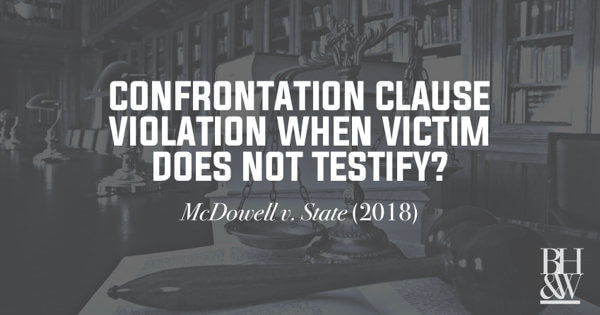Statements by Child Victim to Teacher Were Admissible “Non-Testimonial” Under the Supreme Court’s Confrontation Clause Jurisprudence.
The Sixth Amendment’s Confrontation Clause protects a defendant’s right to confront witnesses against him and raises the issue of how-to-treat admissibility of out-of-court statements. In a landmark 1980 case, the Supreme Court adopted a standard allowing out-of-court statements to be admitted if they are deemed reliable and trustworthy.
In 2004, the Court adopted what this Court called a “different approach,” adopting the position that testimonial statements–out-of-court statements as a substitute for in-court testimony–are inadmissible unless the witness is unavailable to testify in court and the defense had an earlier opportunity for cross-examination.
In 2006, the Court adopted the “primary purpose” test, under which statements made during the course of police interrogation for the primary purpose of meeting an ongoing emergency are not testimonial and are therefore admissible. Only statements made in the course of an investigation for the primary purpose of proving facts relevant to later prosecution are potentially inadmissible.
In 2011, the Court expanded the primary purpose test by requiring the determination of whether a statement is testimonial to consider all the relevant circumstances. Specifically, the Court said statements made to police officers in an informal setting are less likely to be testimonial than a police station interrogation.
All of the cases up to this point had one fact in common–the statements were made to law enforcement officers. The Court had declined to decide the issue of whether the same rules would apply to statements made to individuals other than police officers.
Non-Testimonial Child Statements Admissible Under Confrontation Clause
In Ohio v. Clark, the Court finally had the opportunity to address the question regarding statements made to individuals other than police officers. In Clark’s child abuse trial, statements made by the three-year-old victim to his teachers that Clark had caused his injuries were admitted into evidence. The three-year-old did not testify because of an Ohio law that generally determined children younger than ten years of age incompetent to testify.
The trial court ruled the child’s statements were not testimonial and allowed them to be admitted. Clark was convicted and sentenced to 28 years imprisonment.
A state appellate court reversed the decision. The Ohio Supreme Court upheld the decision of the Appeals Court, concluding the primary purpose of the teachers’ questioning was gathering evidence, not addressing an ongoing emergency. The court considered the teachers agents of the state under the state’s mandatory reporting law and found the child’s statements functionally equivalent to live in-court testimony that was inadmissible.
The United State Supreme Court disagreed and decided the child’s statements were made in the context of an ongoing emergency regarding suspected child abuse. The teachers needed to know who might have abused the child so they would know whether it was safe to release the child to his guardian and to help prevent future attacks. During the spontaneous and informal questioning, the teachers never told the child his statements might be used to punish Clark. The Court found it unlikely the child intended his statements to be a substitute for trial testimony.
The Court declined to adopt a categorical rule that all statements to persons other than law enforcement officers are testimonial, but considered the identity of the questioners in this case and concluded that statements made to individuals not principally charged with uncovering and prosecuting criminal behavior, such as teachers, are less likely to be testimonial.
The Court rejected the argument that the mandatory reporting law transformed teachers into agents of the state, concluding the teachers would have taken steps to protect the child even in the absence of the law. The Court also rejected Clark’s claim that the child’s statements should have been inadmissible because the jury perceived them to be testimonial, noting that theory would render almost all out-of-court statements offered by the prosecution inadmissible.
The Court concluded that because the child’s statements were not made for the primary purpose of creating an out-of-court substitute for trial testimony, they were not testimonial and were therefore admissible.
Although the ruling in the case was unanimous, in an unlikely pairing, Justices Scalia and Ginsburg argued the 2004 decision regarding testimonial statements was adequate to decide this case. They argued the majority’s characterization of the 2006 and 2011 cases as different approaches or alternative tests was an attempt to return to the 1980 standard of reliability when the only issue is whether the statement is made by a witness and is unconfronted.
Justice Thomas argued the Court should in fact return to the 1980 standard of trustworthiness and reliability and apply the same standard to statements made to private individuals and those made to police officers. Thomas characterized the primary purpose test as an “exercise in fiction” and concluded in this case, the child’s statements did not meet the standards of reliability and trustworthiness to fall under the prohibition of the Confrontation Clause








